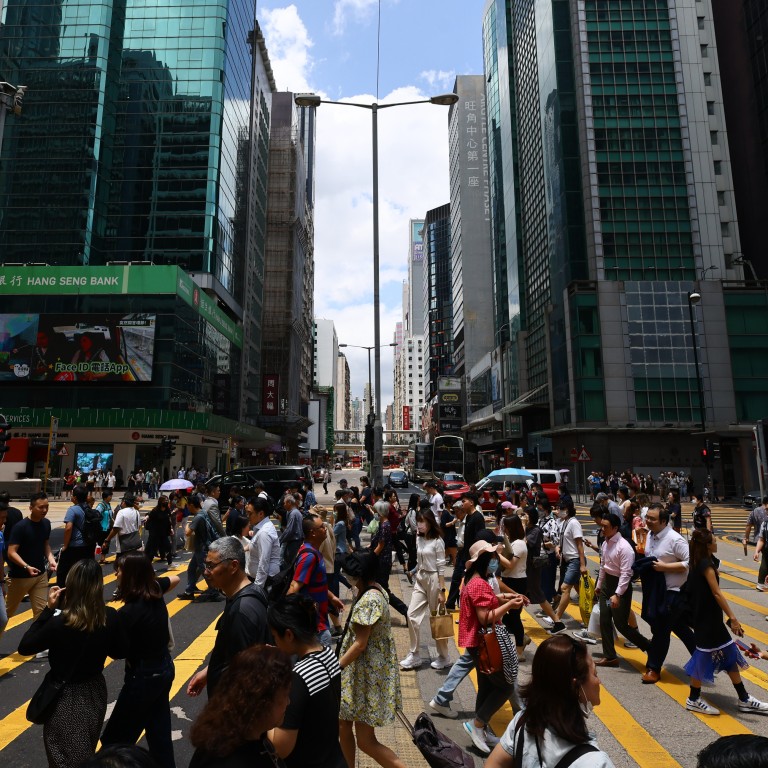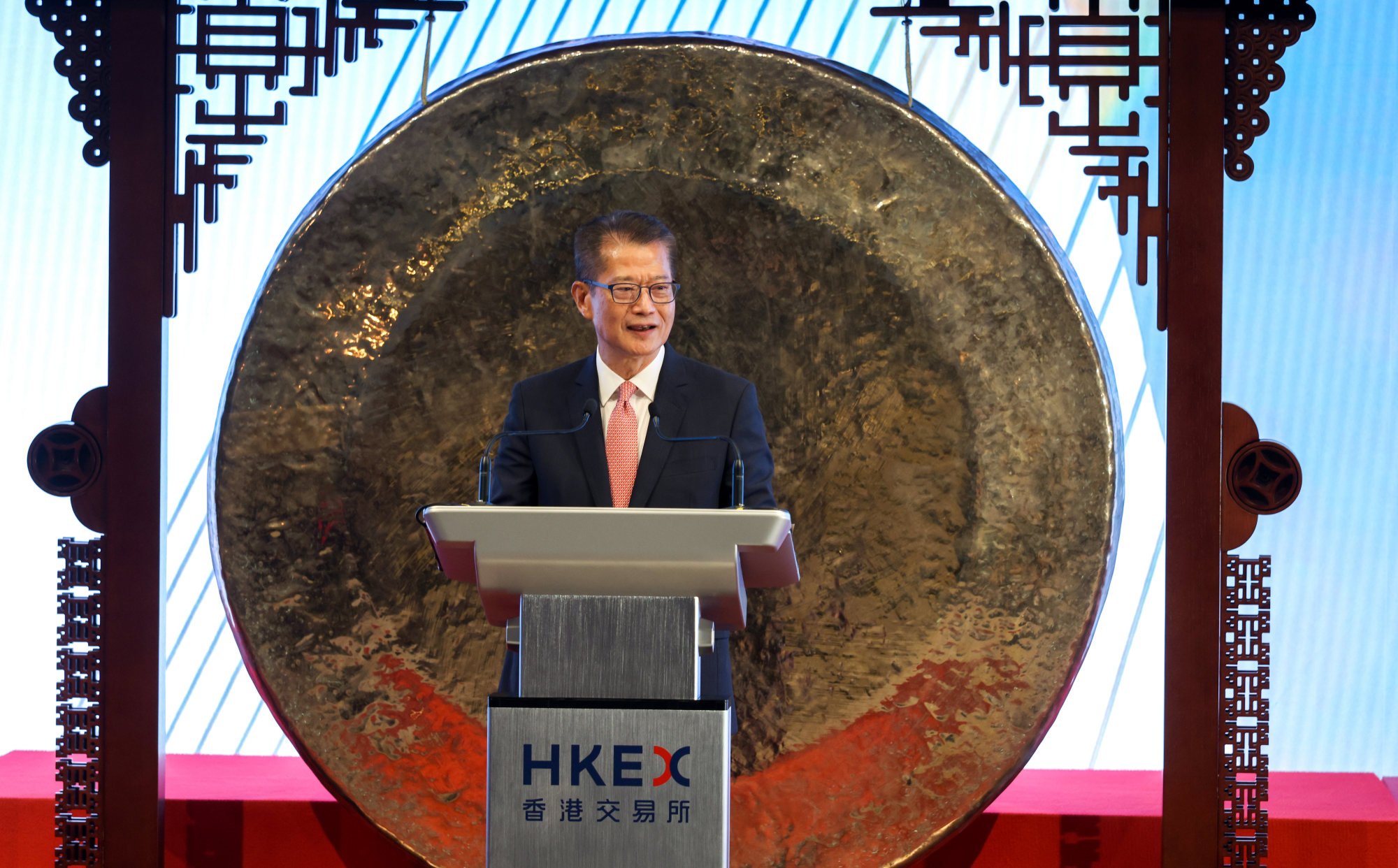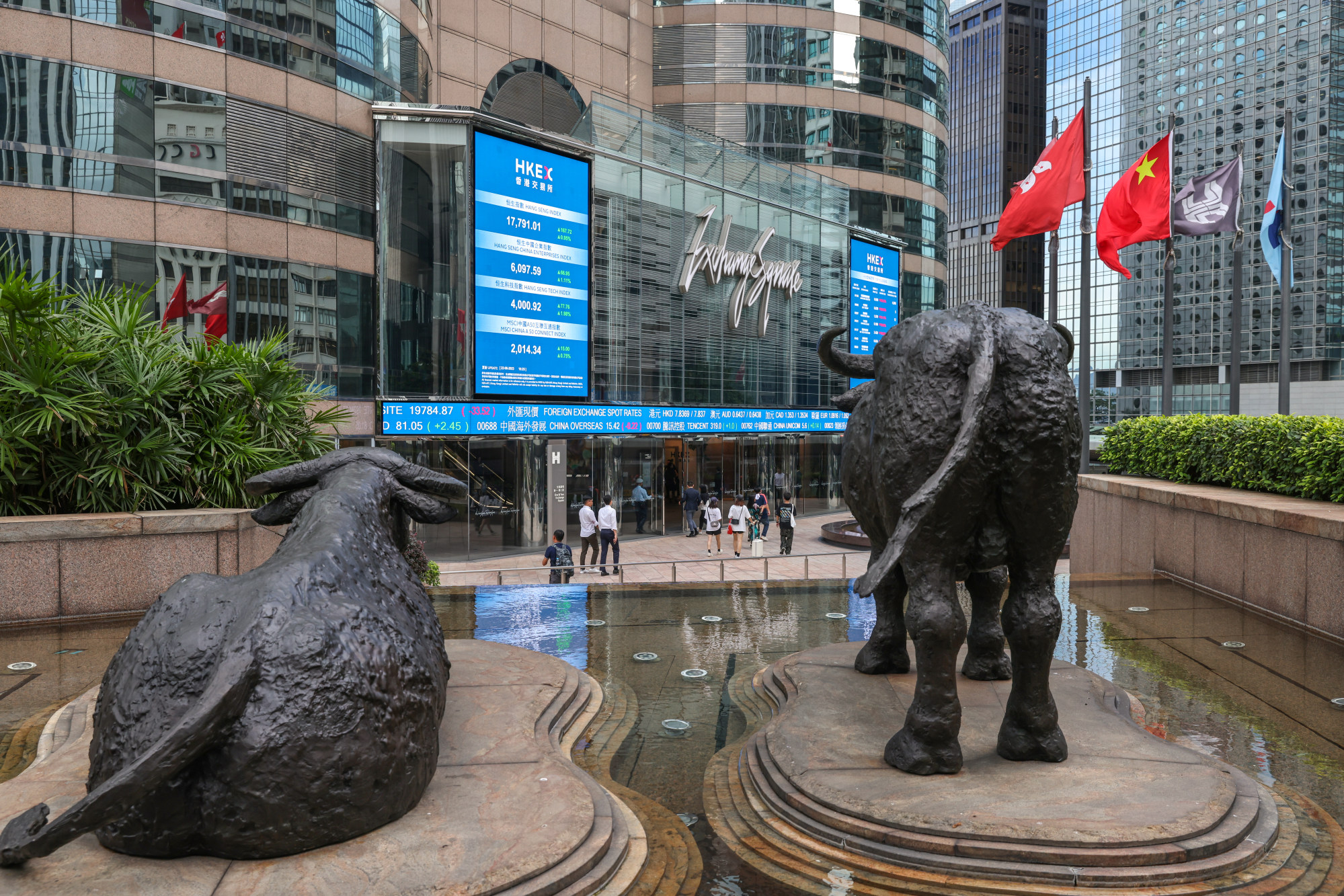
Lowering Hong Kong’s stamp duty on securities trading not silver bullet for sluggish stock market, finance chief warns
- Financial Secretary Paul Chan reveals he plans to visit Europe and the US on an investor charm offensive
- He argues that lower stamp duty won’t resolve market woes or boost turnover in the long run
Outlining options to boost Hong Kong’s standing as an international financial centre, Financial Secretary Paul Chan Mo-po on Sunday commented for the first time on widespread calls for a stamp duty cut since a 13-strong task force was established last week.
Chan said the group would thoroughly review factors behind the lacklustre stock market and come up with the right measures to address structural issues.
He pointed to statistics in arguing that a lower stamp duty would fail to resolve market woes or boost turnover – a measure of stock liquidity based on shares traded for the day – in the long run.
New 13-member Hong Kong task force set up to help boost sluggish stock market
“There are calls in the market for reducing the stamp duty, but statistics have shown that any reduction cannot address structural issues and stimulate turnover over the long run.”
He warned of efforts backfiring: “Any piecemeal stimulus measures will not only fail to boost the market, but further weaken investors’ confidence.”
Last Tuesday, the government announced the task force led by securities regulatory veteran Carlson Tong Ka-shing to look into stock market liquidity, including scrutinising the listing regime, market structure and trading mechanism, to boost the city’s status as a global financial hub.
Chan blamed what he called Western media bias when reporting on Hong Kong and investors’ inability to visit the city during the Covid-19 pandemic for a seemingly unclear picture of the status of the financial hub.
He said he would step up promoting Hong Kong by visiting Europe and the US, while the city would host a series of conferences and summits in coming months. The Financial Secretary’s Office said it would announce Chan’s travel plans when appropriate.
“I will illustrate in person the advantages and opportunities ‘one country, two systems’ [governing principle] brought to Hong Kong, and the latest developments of the city including innovation and technology, green tech, green finance and Web 3,” he said.
Chan, who was not among officials sanctioned by Washington over the promulgation of the national security law in 2020, looked set to be the first senior member of Chief Executive John Lee Ka-chiu’s administration to visit the United States amid ongoing US-China tensions. A visit would follow on the heels of US Commerce Secretary Gina Raimondo’s tour of Beijing and Shanghai last week.
The office also said the US should perform its duty as host of a coming Asia-Pacific Economic Cooperation summit in November by inviting Lee to attend. Washington has been ambiguous about an invitation for Lee, who is under US sanctions.
Locally, Hong Kong FinTech Week will be held in October, followed by the Global Financial Leaders’ Investment Summit in November. The Saudi Arabia-based Future Investment Initiative Institute will hold the Priority Asia Summit in December.
Chan said the task force would draw from the wisdom and work of financial heavyweights and regulatory experts to review stock market advantages and challenges and hammer out strategies over the short, medium and long term.
Members would meet for the first time this week, he said.
In 2021, the city raised stamp duty on the trade value for buyers and sellers on all share transactions by 30 per cent to 0.13 per cent, the third increase since 1998.

Chan noted that in 2021 during the initial months of the increase, between August and December, the average daily turnover of securities trading jumped 2 per cent year on year.
He said the turnover rate jumped to 0.27 per cent in 2022, from 0.22 per cent in 2020, with the higher rate indicating more active trading of stocks.
Chan added that stock-trading activities were affected by geopolitics and market sentiment.
“The task force will review external and internal factors such as the listing regime, market structure and trading mechanism, study how to broaden sources of funding and funding streams, attract more quality enterprises to float on the stock market, innovate investment products and boost the turnover rate of stocks,” Chan said.
Hong Kong ‘to tap financial heavyweights’ for new stock market task force
He added that investors’ appetite also depended on companies’ fundamentals, such as business performance and potential.
Exco convenor Ip, who is also a lawmaker, said reducing stamp duty alone would not turn the market around, but the move would boost investor sentiment and show the government was responsive.
“I think the financial secretary is concerned about revenue loss, but a low market turnover will [also] depress stamp duty revenue,” she said.
“The government needs to adopt other macroeconomic measures to jump-start the economy, not by issuing more consumption vouchers.
“Stamp duty reduction is important as the central authorities have halved their stamp duty on stock transactions, which means that buying H shares is more expensive than A shares.”
H shares are those of mainland-incorporated companies listed in Hong Kong. Securities for such companies listed on the mainland’s bourses are known as A shares and are denominated in yuan.
Hong Kong eyeing task force to improve stock market liquidity: John Lee
Lawmaker Lee, a member of the new task force, said he stood by his call to cut stamp duty but acknowledged it would not solve all the issues facing the market.
“Reducing the stamp duty rate is a mainstream expectation of the industry as a short-term measure to bring a positive message to the market, but it can’t address all the challenges brought by high interest rates and geopolitics.”

Lee said he believed the government ultimately prioritised its own financial health.
His comments echoed those of a source close to the government, who told the Post that authorities would not reduce stamp duty as it could hurt public finances.
“Paul Chan will definitely not agree to reduce stamp duty as it is a crucial contribution to government income,” the source said.
The government, based on actual stamp duty take in 2022-23, has estimated that lowering the rate to 0.1 per cent or zero would cut government revenue by HK$12.3 billion and HK$53.1 billion respectively, accounting for about 2 per cent or 9 per cent of the overall revenue in that year.
Economist Terence Chong Tai-leung, executive director of Chinese University’s Institute of Global Economics and Finance, noted that the government had to achieve a fiscal balance and avoid deficits as stipulated in the city’s mini-constitution, the Basic Law.


